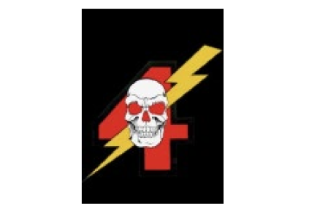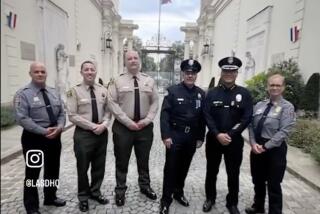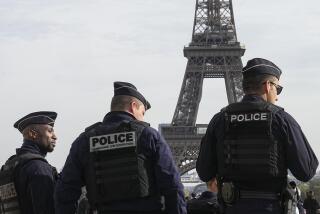Soviet Police Don’t Miss a Beat in U.S. : Law enforcement: Militia officers, on an exchange program, are guests of Sheriff’s Department. They hope to learn new methods of policing.
- Share via
NEWPORT BEACH — The three slightly built men in conservative suits spoke little English, and their hosts were able to manage even less Russian. But when they gathered together to talk shop Friday, there was at once a common language between them.
“We are policemen, and they are policemen,” said Aleksandr Kulikov in his native tongue, pausing to allow an interpreter to translate. “And it’s the responsibility of policemen in their area to protect the people.”
Kulikov’s area is the Russian Republic, nearly twice the size of the United States and populated by 140 million people--all of whom are served by the 40,000 militia officers under Kulikov’s command.
On Friday, the militia major general and two of his colleagues assembled at the Orange County Sheriff’s Department’s Harbor Patrol headquarters in this district of Newport Beach as part of an exchange program between U.S. and Soviet law enforcement agencies.
The Soviet officers arrived last week and have been staying with members of the Sheriff’s Department as they tour training facilities, Harbor Patrol stations and the county’s air-support bureau.
In June, their hosts will reciprocate with a two-week journey to Moscow.
Glasnost may be what made the exchange possible, but the social liberalization of the past few years has also contributed to a rise in hooliganism and ethnic violence that has ripped through the Soviet republics, Col. Viktor Bespalov said.
Bespalov, chief of investigation in the Russian city of Tula about 100 miles south of Moscow, said he is eager to study how ethnic strife in this country was handled during the 1960s civil rights movement.
“It behooves us to try to understand ethnic violence in the U.S., because our country is now experiencing” many of the same problems, he said.
“In Washington, at the airport . . . we couldn’t believe the friendliness of the black and the white people. We couldn’t believe that in the same place both blacks and whites would approach us on the same level.”
Incidents such as the Rodney G. King beating in Los Angeles seemed to him an aberration, said Bespalov, who added that nonetheless, “the police were a bad example to the public.”
Assistant Sheriff Dennis LaDucer, with whom Kulikov is staying, said the Soviet guests are somewhat puzzled by the myriad law enforcement organizations of the United States. The militia, run by the Russian Ministry of the Interior, serves the entire republic.
“I think it’s hard for them to understand that there are 40,000 different law enforcement agencies in this country,” said LaDucer, who said he is trying to master stray Russian phrases to help him in his upcoming trip.
The militia is in the midst of a hiring drought, brought on by the unappealing prospect of relatively meager wages, Bespalov said. The average police officer earns 300 to 400 rubles a month--slim pickings in a country where meat can cost 10 rubles a pound and a nice dress up to 150 rubles.
The historic tension between the people and the Soviet military, which ultimately is in charge of the militia, also tends to discourage potential recruits.
“The prestige of being a police officer is higher in the U.S.,” Bespalov said.
So far Bespalov, Kulikov and Tula criminologist Lt. Col. Viktor Molokanov have toured the sheriff’s headquarters, Orange County Courthouse and Laser Village, a high-tech officer training facility in Orange. On Friday, the three were treated to a cruise of Newport Harbor before joining deputies on patrol.
But a brief weekend visit to Las Vegas has turned out to be the unofficial highlight of the trip.
After attending an evening show, Kulikov “got a chance to meet Wayne Newton and shake his hand,” LaDucer recalled. “The major general also happens to be a singer, so he presented Wayne with a Russian police hat.”
For Bespalov, the delights were monetary. The sole winner among the three at the casino, Bespalov produced Friday a glinting handful of loose change--about $3 worth--for eager reporters to peer at.
“The first money I earned in the U.S.,” he said with a broad smile.
More to Read
Sign up for Essential California
The most important California stories and recommendations in your inbox every morning.
You may occasionally receive promotional content from the Los Angeles Times.














